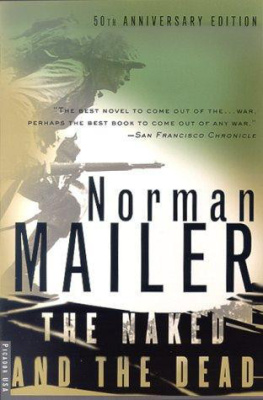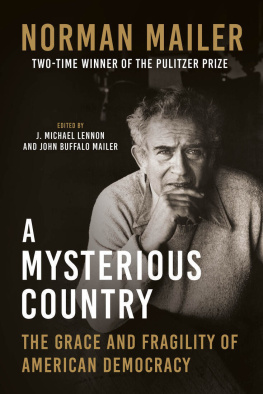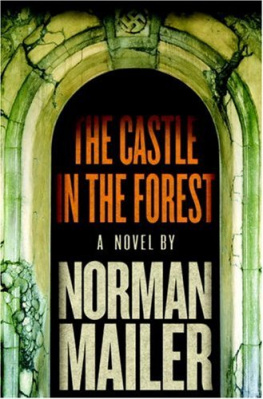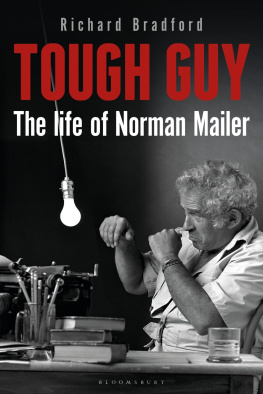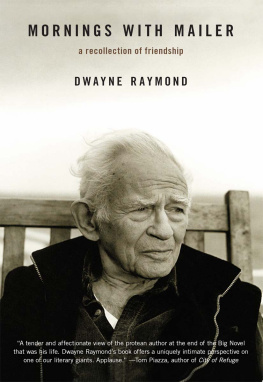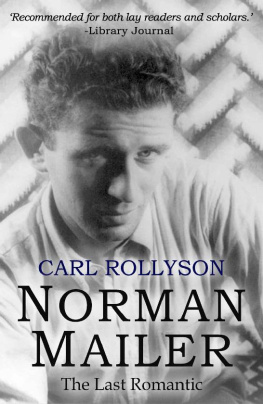| The naked and the dead |
| Norman Mailer |
| New York, N.Y. : Picador/H. Holt, 1998. (1948) |
From Library Journal
This 50th-anniversary edition of Mailer's World War II epic contains a new introduction by the author. If your current copy is falling apart, now is the time to replace it.
Copyright 1998 Reed Business Information, Inc.
Review
"The best novel to come out of the... war, perhaps the best book to come out of any war."San Francisco Chronicle
"Best novel yet about World War II."Time
"Brutal, agonizing, astonishingly thoughtful."Newsweek
"Nightmarish masterpiece of realism."Cleveland News
"Vibrant with life, abundant with real people, full of memorable scenes. To call it merely a great book about the war would be to minimize its total achievement."The Philadelphia Inquirer
"The most important American novel since Moby-Dick ."Providence Journal
-- Review
The Naked and the Dead
NORMAN MAILER
Bookflap:
A Word from the Publisher to the Reader... Twenty-seven years ago I was fortunate enough to be associated with the publication of John Dos Passos' Three Soldiers. In no year since have I felt the same surge of excitement for a war novel -- not until the manuscript of Norman Mailer's The Naked and the Dead was readied for publication.
There is no direct parallel between the two books. The world has changed and toughened since Dos Passos wrote. The Naked and the Dead is a tougher book, one that reflects the variables that time and change have introduced. But, like its distinguished predecessor, Norman Mailer's book is essentially the story of men themselves rather than of their sometimes purposeless fighting. These men who tear their hearts out trying to capture an island from the Japanese are the product of the years they have lived. They have been formed by their wives, their sweethearts, their farms, their jobs, their colleges. To each, war has been an activating agent.
I believe you will never forget these men -- frightened men, sometimes obscene, humorous, sick, scabrous, full of yearning for home as it was, or home as it seems in memory. They are men in war, but like most of us, they do not know where they are going; they know only their own past.
Because I believe The Naked and the Dead is a great novel I can say that if you have read Thomas Boyd's Through the Wheat , Remarque's All Quiet on the Western Front , Hemingway's Farewell to Arms , or Three Soldiers, you cannot afford to pass by this astonishing performance by a young man who at twenty-five knows more about the core of man than many a writer of twice his years.
Stanley W. Rinehart Jr.
Rinehart & Company, Inc.
New York Toronto
Grateful thanks are expressed to the publishers and copyright owners for permission to reprint lyrics from the following songs:
Betty Co-ed, by Paul Fogarty and Rudy Vallee.
Copyright 1930, by Carl Fischer, Inc., New York, and used with their permission.
Brother, Can You Spare a Dime? Words by E. Y. Harburg, music by Jay Gorney.
Copyright 1932, by Harms, Inc., and used with the permission of Music Publishers Holding Corporation.
Faded Summer Love, words and music by Phil Baxter.
Copyright 1931, by Leo Feist, Inc., and used with their permission.
I Love a Parade, words by Ted Koehler, music by Harold Arlen.
Copyright 1931, by Harms, Inc., and used with the permission of Music Publishers Holding Corporation.
Show Me the Way to Go Home, words and music by Irving King.
Copyright 1925, by Harms, Inc., and used with the permission of Music Publishers Holding Corporation.
These Foolish Things Remind Me of You, by Jack Strachey, Hold Marvel and Harry Link.
Copyright 1935, by Bourne, Inc., and used with their permission.
All characters and incidents in this novel are fictional, and any resemblance to any person, living or dead, is purely coincidental.
Copyright 1948, BY NORMAN MAILER
PRINTED IN THE UNITED STATES OF AMERICA
BY THE HADDON CRAFTSMEN, INC., SCRANTON, PA.
ALL RIGHTS RESERVED
I would like to thank William Raney, Theodore S. Amussen, and Charles Devlin for the aid and encouragement given me at various times in the writing of this novel.
To my Mother and Bea
PART ONE
Wave
Nobody could sleep. When morning came, assault craft would be lowered and a first wave of troops would ride through the surf and charge ashore on the beach at Anopopei. All over the ship, all through the convoy, there was a knowledge that in a few hours some of them were going to be dead.
A soldier lies flat on his bunk, closes his eyes, and remains wide-awake. All about him, like the soughing of surf, he hears the murmurs of men dozing fitfully. "I won't do it, I won't do it," someone cries out of a dream, and the soldier opens his eyes and gazes slowly about the hold, his vision becoming lost in the intricate tangle of hammocks and naked bodies and dangling equipment. He decides he wants to go to the head, and cursing a little, he wriggles up to a sitting position, his legs hanging over the bunk, the steel pipe of the hammock above cutting across his hunched back. He sighs, reaches for his shoes, which he has tied to a stanchion, and slowly puts them on. His bunk is the fourth in a tier of five, and he climbs down uncertainly in the half-darkness, afraid of stepping on one of the men in the hammocks below him. On the floor he picks his way through a tangle of bags and packs, stumbles once over a rifle, and makes his way to the bulkhead door. He passes through another hold whose aisle is just as cluttered, and finally reaches the head.
Inside the air is steaming. Even now a man is using the sole fresh-water shower, which has been occupied ever since the troops have come on board. The soldier walks past the crap games in the unused salt-water shower stalls, and squats down on the wet split boards of the latrine. He has forgotten his cigarettes and he bums one from a man sitting a few feet away. As he smokes he looks at the black wet floor littered with butts, and listens to the water sloshing through the latrine box. There has been really no excuse for coming, but he continues to sit on the box because it is cooler here, and the odor of the latrine, the brine, the chlorine, the clammy bland smell of wet metal is less oppressive than the heavy sweating fetor of the troop holds. The soldier remains for a long time, and then slowly he stands up, hoists his green fatigue pants, and thinks of the struggle to get back to his bunk. He knows he will lie there waiting for the dawn and he says to himself, I wish it was time already, I don't give a damn, I wish it was time already. And as he returns, he is thinking of an early morning in his childhood when he had lain awake because it was to be his birthday and his mother had promised him a party.
Early that evening Wilson and Gallagher and Staff Sergeant Croft had started a game of seven card stud with a couple of orderlies from headquarters platoon. They had grabbed the only empty place on the hold deck where it was possible to see the cards once the lights were turned off. Even then they were forced to squint, for the only bulb still lit was a blue one near the ladder, and it was difficult to tell the red suits from the black. They had been playing for hours, and by now they were in a partial stupor. If the hands were unimportant, the betting was automatic, almost unconscious.
Wilson's luck had been fair from the very beginning, but after one series in which he had taken three games in a row it had become phenomenal. He was feeling very good. There was a stack of Australian pound notes scattered sloppily and extravagantly under his crossed legs, and while he felt it was bad luck to count his money, he knew he must have won nearly a hundred pounds. It gave him a thick lustful sensation in his throat, the kind of excitement he received from any form of abundance. "Ah tell ya," he announced to Croft in his soft southern voice, "this kind of money is gonna be the ruination of me yet. Ah never will be able to figger out these goddam pounds. The Aussies work out everythin' backwards."
Next page
